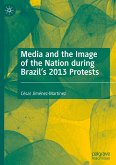This book offers a unique perspective on the Brazilian communication environment in the middle of its most serious political crisis after a military dictatorship. The 2013 protests were an important turning point in the political life of the country, and are often seen as the trigger of many communicational and political dynamics that have led to recent political events, such as the election of a far right wing president. Understanding the transformation of the communication environment at that moment, as well as its consequences, helps to explain what is happening in the country today. The book's argument finds its foundations in the following: a systemic view of the communication environment, a conception of technology as structured and transformed by its use, and an understanding of communicational dynamics as an essential part of democratic systems. Drawing on both interviews with key actors in the protests and on analysis of a corpus of tweets, the book assesses the relationship between the use of social media and the formation of mainstream discourses surrounding the concept of mediactivism. It also investigates alternative paths of information made possible by the use of social media when new mediators emerge, going on to search for an understanding of the consequences of social media visibility dynamics on the construction of the common world.
Bitte wählen Sie Ihr Anliegen aus.
Rechnungen
Retourenschein anfordern
Bestellstatus
Storno








